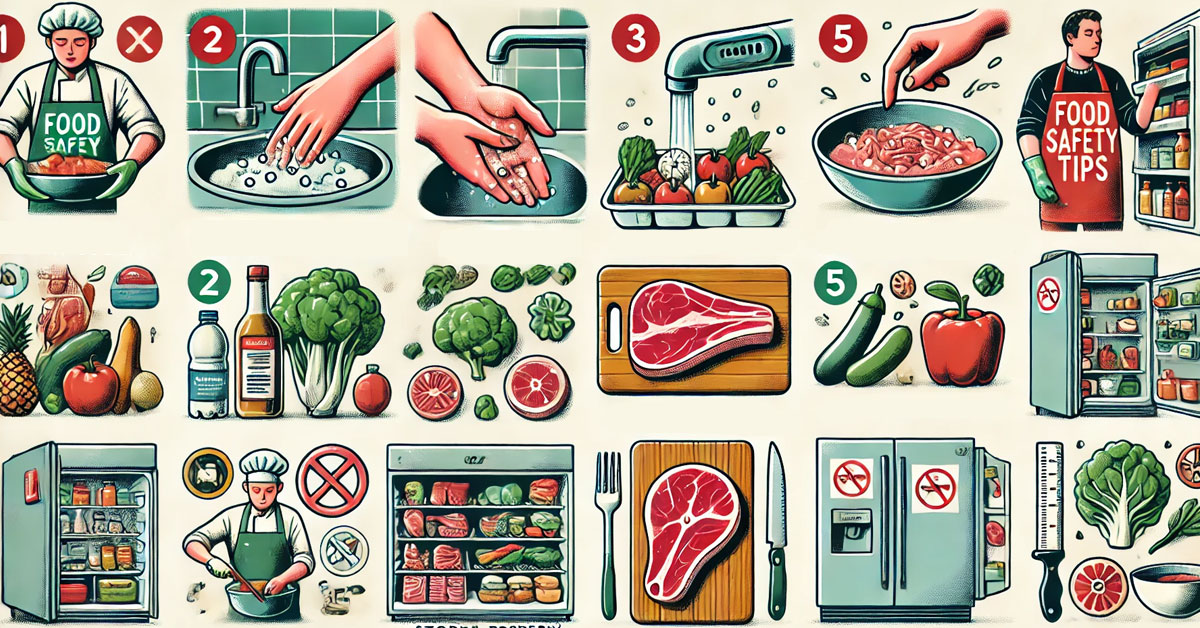

KATHMANDU : Cooking safely is essential for maintaining good health and avoiding foodborne illnesses. Food borne disease can result from consuming food contaminated with harmful microorganisms such as bacteria, viruses, and parasites. Many of these illnesses are preventable through proper cooking, handling, and food safety practices.
Foodborne illnesses are a serious public health concern worldwide, causing millions of people to suffer every year. While foodborne illness can happen at any stage of the food preparation process. This article will delve into the key principles and guidelines for safe food preparation and cooking to help reduce the risk of foodborne illnesses.
Foodborne illnesses occur when food is contaminated with harmful microorganisms or toxins. Here’s a brief description of common causes:
Keep Kitchen Clean and Organized
A clean cooking environment is essential in preventing foodborne illnesses. Cross-contamination can occur if harmful microorganisms from raw foods are transferred to other foods, utensils, or surfaces. To minimize this risk, consider the following:
Be Cautious When Using Non-Meat Products
While meat is a common source of foodborne illness, it’s essential to be cautious with other foods as well.
Produce like leafy greens, sprouts, and berries can also harbor harmful bacteria, so it’s important to,Wash Produce Thoroughly: Wash fruits and vegetables under running water, even if you’re not planning to eat the peel. For produce with thick peel , like melons or cucumbers, scrub them with a clean vegetable brush.
Use Organic or Conventional Produce Safely: Whether you buy organic or conventional produce, wash it properly to remove potential pesticide residues and bacteria.
Be Cautious with Raw Sprouts: Raw sprouts, such as alfalfa, can be a breeding ground for harmful bacteria. If possible, avoid raw sprouts or cook them before eating.
Properly Store Food
Proper food storage is vital to maintaining the safety and quality of food. Incorrect storage can promote the growth of harmful bacteria, leading to foodborne illness.
Refrigeration: Make sure your refrigerator is at the right temperature below 40°F (4°C). Perishable items like dairy, meat, seafood, and eggs should always be stored in the fridge immediately after purchase.
Freezing: Freezing food is an effective way to prolong its shelf life and prevent the growth of harmful microorganisms. Ensure that your freezer is at 0°F (-18°C) or lower.
Be mindful of expiration dates
Always check expiration dates on food labels before cooking. While many foods can still be safe after their expiration dates it’s better to err on the side of caution and dispose of expired items.
Pay Attention to Special Considerations
Certain populations, such as pregnant women, young children, elderly adults, and people with weakened immune systems, are at a higher risk of developing severe complications from foodborne illnesses. Take extra care when cooking for these individuals by:
Ensuring that all food is cooked to the appropriate temperature.
Avoiding high-risk foods like raw or undercooked eggs, meats, and seafood.
Practicing good hygiene and sanitation practices, especially when handling foods that are more likely to be contaminated, like unwashed fruits and vegetables.
How to Cook Safely to Avoid Foodborne Illnesses in Nepal
Cooking safely to avoid foodborne illnesses is crucial for maintaining good health, especially in Nepal, where foodborne diseases are common due to improper handling and sanitation practices. Here are some essential steps to ensure food safety while cooking.
Clean and Sanitize Kitchen Surfaces: In Nepal, kitchens can often be humid and prone to contamination. It’s vital to regularly clean countertops, cutting boards, knives, and other utensils used in food preparation. Use hot soapy water and sanitize surfaces with a mild disinfectant to prevent cross-contamination.
Avoid Cross-Contamination: Cross-contamination happens when raw food comes into contact with cooked food. To avoid this, keep raw meat, poultry, and seafood separate from ready-to-eat foods like fruits, vegetables, and cooked dishes. Use separate cutting boards for raw meat and vegetables to reduce the risk of contamination.
Wash Your Hands Properly: One of the simplest and most effective ways to prevent foodborne illness is by washing hands thoroughly before and after handling food. Always use soap and clean water to wash your hands, especially after handling raw meat, vegetables, or after using the bathroom.
Cook Food Thoroughly: Ensure that food is cooked to the correct internal temperature to kill harmful bacteria. In Nepal, where meat is often consumed in dishes like momo or meat curries, it is important to cook these items well.
Be Mindful of Water Safety: In many parts of Nepal, waterborne diseases are common due to contamination. Always ensure that drinking water is properly filtered or boiled before use in cooking. Avoid using untreated water for washing fruits and vegetables, as this can lead to foodborne illness.By following these basic food safety practices, people in Nepal can reduce the risk of foodborne illnesses
Conclusion
In conclusion, cooking safely is essential for maintaining good health and preventing foodborne illnesses. Foodborne diseases, caused by harmful microorganisms such as bacteria, viruses, parasites, and toxins, are a significant public health concern worldwide. These illnesses are preventable by adopting proper food safety practices throughout the food preparation process, including proper cooking, handling, and storing of food.
By maintaining a clean and organized kitchen, washing hands thoroughly, avoiding cross-contamination, and storing food properly, the risk of contamination can be significantly reduced. Additionally, being cautious with raw and non-meat products, such as fresh produce, is equally important. It’s also vital to ensure food is cooked to the appropriate temperatures and that special care is taken when cooking for vulnerable populations, such as pregnant women, young children, elderly adults, and those with weakened immune systems.
In places like Nepal, where foodborne diseases are common due to improper sanitation and handling, it is especially important to practice food safety measures like cleaning kitchen surfaces, avoiding cross-contamination, ensuring water safety, and cooking food thoroughly. By following these guidelines, we can significantly reduce the risk of foodborne illnesses and promote better health and well-being for ourselves and others.